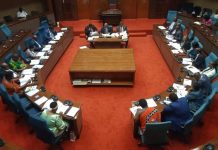Africa-Press – Eswatini. Corruption is bad; I don’t want it and certainly don’t think His Majesty King Mswati III as the head of State in the Kingdom of Eswatini wants it either.
The voters have a role to play in eradicating corruption in our government. Corrupt politicians should be stopped at the starting line; the ballot box. I wish I could stand on the tallest mountain in the country and shout for everyone to hear. Can we at least have a corrupt-free 12th Parliament and may I humbly request the electorate not to elect corrupt individuals.
I know that the electorate knows these people. They live among us and we know that they are corrupt and by giving them our vote, we are basically abetting them in their act. By crossing their face we are basically signing over a five-year contract giving them more power and access to do their thing.
Corruption is the misuse of public office for private gains. It leads to the misallocation of talent, technology and capital and thereby hinders economic growth. According to the World Economic Forum, the problem of corruption is enormous and its cost is estimated to be around five per cent of the global gross domestic product (GDP)
Competition
Why does corruption persist in many governments? Why does political competition often fail to eliminate corruption, why do voters not elect politicians who are not corrupt? This and many other questions have boggled my mind, especially as we draw nearer to the secondary elections on September 29, 2023. I repeat that the voters have power to cut the scourge right at the beginning.
In the broader political economy literature, the conventional wisdom suggests that voter ignorance is a prime factor for why criminal or corrupt politicians win elections. It is also assumed that when social tensions are rife and the credibility of the state is weak, many voters seek refuge in the hands of a strongman who can fill in for the State’s various governance deficits in service of his particular community. There are some scholars who argue that voters, when making electoral choices, often make a mental trade-off between honesty and competence.
If you encounter a politician who is corrupt or dishonest, you might be willing to look the other way when it comes to allegations of malfeasance because you rate him or her to be highly effective. There are many politicians we could think of, whose success is probably a result of this sort of calculation.
In developing democracies, the situation is a bit different; it is not that voters simply make a trade-off between honesty and competence, but it is that lack of honesty actually signifies competence. The difference between the two probably has a lot to do with the weakness of the State’s writ in many developing societies. In these settings, there might be a premium on having a representative who is willing to run afoul of the law in order to ‘get things done.’However, there is no form of corruption that is better or should be praised.
Establishment
Corruption is closely linked to the generation of economic rents and rent-seeking. This refers to those securing above-normal returns from an asset, not by adding value to it through investment, but rather through manipulating the social and political environment. The establishment of a monopoly is a classic example of this. The asset then becomes inherently more valuable. Rent-seeking involves corruption whereby the payment of bribes is necessary to manipulate the environment so as to benefit a particular actor.
We are aware that some of the honest candidates in the current list will face sharks in Parliament. Some will be swallowed and we stand as witnesses of those who will swim through. The biggest source that corrupts even the honest individuals is the economic battle that goes on in the corridors of wealthy.
There is bidding going on and the wealthiest want to control the political seats such that even the honest and innocent candidates are no longer safe from the jaws of corruption. The purpose is simple; the capitalistic mind is willing to pay and sway votes for two reasons only; to obtain government benefits and to avoid costs. While some want influence and power, others only want to blind the oversight eye so they can keep doing what they do. They want to mute the voice of the people so they can continue inflicting economic pain on them without the world noticing or hearing any cry.
Candidates
I want to plead with the electorate to keep the voice of the people loud and help His Majesty in the never-ending fight against corruption by voting out all corrupt candidates. This is my passionate plea, akusehlule lokunye, but let us at least vote right. These elections are very important, we are not just voting for service delivery, but we are voting for economic survival. We cannot continue to allow corrupt politicians to manipulate us.
Elections are a crucial component of democratic governance and for a long time, the international community has pinned great expectations on their ability to promote greater accountability. However, the picture produced over the years has been mixed. It highlighted that elections may generate dynamics that can be conducive to corruption, through factors such as patronage and vote-buying.
I appreciate the current electoral system of plurality or majority based on individual merit because it enables voters to vote for candidates and not just for parties because candidates appeal to voters directly. That is my conviction and don’t blame me for it because I am not you. As such, the current system establishes a strong electoral connection between the voter and elected politicians in terms of geographic representation, which makes accountability linkages clearer and stronger.
Based on the above, the candidates are assumed to be less likely to encourage corruption, essentially because it is easier for voters and opposition parties to monitor the behaviour of incumbents who appeal to voters directly.
There is a new area of research that focuses on electoral malpractice, or the manipulation of the electoral process in ways that benefit particular candidates over others and create an unlevelled playing field.
Proponents
This is a modernised form of corruption that will disrupt and tear to pieces our political system. The proponents of electoral malpractice are shrewd and cunning; they fund candidates and feed the electorate to sway their vote.
Many are also related to corruption, including, for instance, the abuse or manipulation of administrative resources, vote-buying and unaccounted or illicit campaign financing.
Electoral malpractice has become an increasing problem in emerging democracies in the developing world. Though still in its infancy, in terms of both theory-building and the generation of evidence, this studies being have begun to generate some interesting hypotheses and findings. A Parliament is a country’s central institution, in its capacity as the primary expression of the people’s will and therefore has a paramount responsibility for combating corruption in all its forms, especially in public life but increasingly also in the economy at large.
Corruption exists in different contexts and can mean many things. In economics, the most accepted definition of corruption is ‘the use of public office for private gains’. It can be argued that this definition is very limited and that in real life, corruption exists outside the public sphere and can take different forms. Bardhan (1997) for instance, gives the example of a private seller that supplies a scarce good.
Given that this good is not available for everyone or there are long queues to get it, people might be tempted to bribe the seller either to jump the queue or to have the opportunity to buy the good. However, in politics, corruption is the use of powers by government officials or their network contacts for illegitimate private gain.
My parting advice to the electorate ahead of the big day is to know the person you are voting for. Do not vote because of hunger, others will starve you so they can feed you again for your vote. Maybe the time has come that our electoral laws should consider as a starting point that one precondition for electoral accountability should be sucient knowledge by the citizenry of politicians’ records.
Source: TIMES
For More News And Analysis About Eswatini Follow Africa-Press







